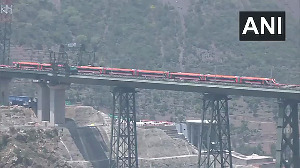Some global banks are taking a "long and hard look at Indian banks" for possible acquisition following the government's decision to increase the foreign direct investment in the sector and allowing foreign banks to float 100 per cent subsidiary.
"The risk management of Indian banks is of global standard. They are also very advanced on the technology front," said Charles H Dallara, managing director of Institute of International Finance Inc.
The Washington based IIF is the only global association of banks which has over 350 members across the globe including eight Indian banks.
Dallara, who has been on his first visit to India, is impressed with the Indian banking system. "Most of the banks here are ready for the Basle II norms. Frankly banks in India are stronger than their counterparts in many emerging markets. Their non-performing loans are not very high and unlike some other countries can never post a threat to the system," he said.
The IIF chief felt that the time is just ripe for consolidation in the Indian banking sector and momentum in privatisation. "You need privatisation to infuse competition. The government should bring down its stake in banks. Only when they are competitive commercial organisations, they can introduce new products in the market," Dallara pointed out.
However, he did not see the government posing any hindrance to the state run banks' performance. "I tell you, India's state run banks are far better than the state run banks of so many countries. They are run commercially. They are competitive," he said.
Reduction in the role of government ownership will, however, make the banks more efficient and help them rise to new challenges, he added. He also felt that the government out is crowding out the credit market with its huge borrowing programme. "If the government wants the banks to be active in project financing, it should not be the dominant player in the credit market," he said.
He found nothing wrong in Indian banks' new found passion for retail lending.
"There is enormous scope for consumer lendings. I don't see a Korea like situation here. The growing Indian economy will give them opportunity to expand their retail assets. The banks' risk management is in place. It's too early to look for any concerns," he said.
Dallara felt that the India story which is being talked about across the globe is genuine but had a word of caution: the rising tide of FII investment may slowdown when the US interest rates go up. "There has been strong appetite for all emerging market papers and the trend can be reversed. India should build on this bullish sentiment by pushing for labour reforms and liberalising trade. Political stability will help it do so," he said.






